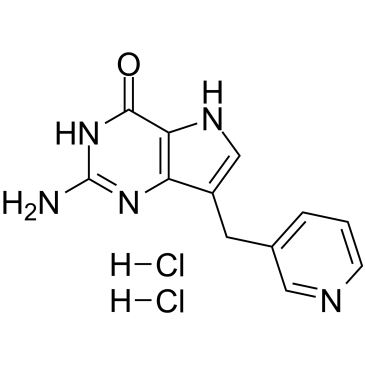Peldesine dihydrochloride (Synonyms: BCX 34 dihydrochloride) |
| Catalog No.GC61633 |
Peldesine (BCX 34) dihydrochloride is a potent, competitive, reversible and orally active purine nucleoside phosphorylase (PNP) inhibitor with IC50s of 36 nM, 5 nM, and 32 nM for human, rat, and mouse red blood cell (RBC) PNP, respectively.
Products are for research use only. Not for human use. We do not sell to patients.

Cas No.: 2772702-10-8
Sample solution is provided at 25 µL, 10mM.
Peldesine (BCX 34) dihydrochloride is a potent, competitive, reversible and orally active purine nucleoside phosphorylase (PNP) inhibitor with IC50s of 36 nM, 5 nM, and 32 nM for human, rat, and mouse red blood cell (RBC) PNP, respectively. Peldesine dihydrochloride is also a T-cell proliferation inhibitor with an IC50 of 800 nM. Peldesine dihydrochloride has the potential for cutaneous T-cell lymphoma, psoriasis and HIV infection research[1][2][3][4].
Peldesine (BCX 34; 0-50 µM; 72 hours; Jurkat cells) could inhibit the T-cell proliferation completely at a concentration of less than 10 μM, in the presence of dGuo (10 μM). In contrast, the B-cell proliferation is not affected by Peldesine[1].Peldesine (BCX 34) suppresses T-cell immune reaction in an IL-2-independent manner, and this means that Peldesine might affect a late phase rather than an early stage in T-cell activation[1].Peldesine also, in the presence but not in the absence of deoxyguanosine, inhibits human leukemia CCRF-CEM T-cell proliferation with an IC50 of 0.57 μM but not rat or mouse T-cell proliferation up to 30 μM[3]. Cell Viability Assay[1] Cell Line: Jurkat cells
[1]. Wada Y, et al. BCX-34: a novel T-cell selective immunosuppressant: purine nucleoside phosphorylase (PNP) inhibitor. Artif Organs. 1996 Aug;20(8):849-52. [2]. Duvic M, et al. A phase III, randomized, double-blind, placebo-controlled study of peldesine (BCX-34) cream as topical therapy for cutaneous T-cell lymphoma. J Am Acad Dermatol. 2001 Jun;44(6):940-7. [3]. Bantia S, et al. In vivo and in vitro pharmacologic activity of the purine nucleoside phosphorylase inhibitor BCX-34: the role of GTP and dGTP. Immunopharmacology. 1996 Oct;35(1):53-63. [4]. New AIDS study suppresses T cells to stop viral growth. AIDS Alert. 1997 Jul;12(7):77-8.
Average Rating: 5 (Based on Reviews and 3 reference(s) in Google Scholar.)
GLPBIO products are for RESEARCH USE ONLY. Please make sure your review or question is research based.
Required fields are marked with *




















